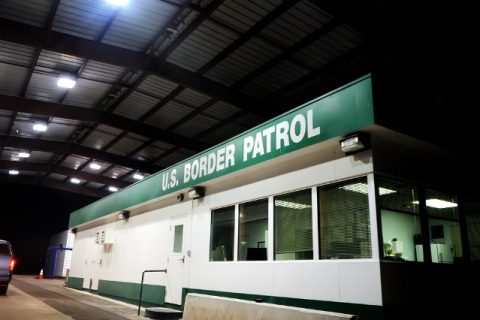Immigration at the Border

How Budget Cuts From Sequestration Will Affect The Nation’s Immigration System
The U.S.’s immigration system, already burdened by application processing backlogs and insufficient funding for immigration courts, could become even more unwieldy if the government must slash its budget on March 1. Sequestration – a package of across-the-board government spending cuts totaling $85 billion this year and $1.2 trillion over the next decade – likely will go into effect on Friday unless Congress and President Obama manage to reach a deal. Currently, there are no reports of ongoing negotiations to avert the automatic cuts, so when the cuts kick in, all aspects of the immigration system – from visas to deportations – would be impacted. Read More

SCOTUS Narrows Protections For Noncitizens Who Received Poor Legal Advice
Almost three years ago, in the landmark decision Padilla v. Kentucky, the Supreme Court acknowledged the severity of deportation and that our current immigration laws make “removal nearly an automatic result” for many noncitizens convicted of crimes. Consequently, the Court held that a criminal defense attorney must advise noncitizen clients about the risks of deportation if they accept a plea bargain. If the defense attorney fails to provide this advice, the noncitizen can seek to have the conviction set aside. Such recourse brings integrity to the criminal justice and immigration systems and ensures that immigrants who reasonably rely on advice from their lawyers are not unfairly held accountable for their lawyers’ mistakes. Read More

Reaching the Six-Month Mark on Deferred Action for Childhood Arrivals (DACA)
The Department of Homeland Security has issued its latest data on the Obama Administration’s initiative that offers deferment from deportation and temporary work permits to young undocumented immigrants under the Deferred Action for Childhood Arrivals (DACA) initiative. In the first six months of the program (August 15–February 14), 423,634 out of the roughly 936,933 immigrants between the ages of 15 and 30 who might immediately meet the requirements, have had their applications accepted for processing. In other words, approximately 45% of those potentially eligible for the program have applied in the first six months. In addition, since February, 199,460 individuals have been approved for DACA and will receive two-year temporary work permits. Read More

Putting the White House Immigration Reform Proposal into Perspective
Over the weekend, the press reported on a leaked draft of portions of the White House’s immigration proposal, and the coverage since then has been largely a frenzied discussion of whether the leak will kill Senate negotiations. There shouldn’t be much chance of that, given the immense pressure on the Senate to not only come up with a proposal, but actually draft legislation that can be debated and voted on this year. Now that at least some of the Administration’s ideas are out in the public eye, it’s useful to treat them as what they are: basic discussion points on what might be in an eventual bill. In the long run, the draft proposal may help to encourage the constructive conversation that the Administration has sought to have on reform. Read More

Shoddy Court Process Behind the Record Number of Deportations
The Obama Administration is on record for pursuing the toughest immigration enforcement policies in U.S. history, mostly evidenced by its record numbers of deportations. These numbers speak volumes: last year, nearly 400,000 people were deported from the United States. While these numbers are shockingly high and there has been much discussion about how these actions tear families and communities apart, there has also been an under-reporting of the unfair and often expedited process that leads to the deportation of hundreds of thousands of people each year. In fact, two-thirds of the individuals removed are done so without ever seeing the inside of an immigration courtroom and are not accorded many other basic due process protections. Read More

True Border Security and Legalization Go Hand in Hand
A sticking point in current and past immigration reform proposals has been the misguided belief that a legalization program for unauthorized immigrants cannot proceed until the border is “secure.” The immigration framework developed by the Senate “Group of 8” introduces that same sticky framework by proposing to create certain border-security benchmarks that must be met before a legalization program can begin. Not only has this not worked in the past, given that benchmarks from multiple past proposals have actually already been met, but creating a truly “secure border” actually requires a new understanding of what the problems are at the border. Read More

House Republicans Show Uncertainty About Where the Party Stands On Immigration
For six hours on Tuesday, the Republican-controlled House Judiciary Committee tried to come to terms with a new landscape on immigration reform and where House Republicans will fit into the picture. Despite attempts by committee leadership to paint an earned path to citizenship as an extreme option and questions about whether citizenship was even necessary, there were signs of common ground, signaling opportunities for breaking the logjam on immigration in the House. Read More

Politicians Invent Doomsday Predictions About Immigration Reform
Nativists are rarely encumbered by facts. By its very nature, nativist rhetoric is based on stereotype and mythology, not empirical evidence. Regrettably, some of our elected leaders in the House of Representatives and the Senate have embraced the mirage of nativism as they embark on a crusade to derail any meaningful reform of the U.S. immigration system. More precisely, anti-reform politicians have been issuing doomsday predictions about what will happen to the nation if a legalization program is created for unauthorized immigrants already living in the United States. It comes as little surprise that these predictions have no basis in reality. Read More

Incentivizing Arrests for Border Patrol Agents
Strengthening border security, including increasing the number of border patrol agents, continues to be a component of the latest immigration reform proposals, as they have in the past. What may be overlooked in these proposals is the administration’s call for enhanced training to protect civil rights. This is critical, given the results of a new report by Families for Freedom and New York University School of Law’s Immigrant Rights Clinic titled, Uncovering USBP: Bonus Programs for United States Border Patrol Agents and the Arrest of Lawfully Present Individuals. The report describes a series of operational flaws within USBP, including a previously undisclosed employee rewards program to encourage arrests. Read More

New Report Shows That Border Benchmarks Already Have Been Met
As the components of what should be included in an immigration reform bill take shape, border security, along with enforcement, is proving to be a key part of the framework. Eight senators released a bipartisan proposal earlier this week that included a path to citizenship for the 11 million unauthorized immigrants currently living in the United States. The catch is that implementation of this provision is “contingent upon our success in securing our borders and addressing visa overstays.” The day after the senators presented their framework, President Obama laid out his vision of what should be included in immigration reform legislation during a speech to labor leaders in Nevada. The president called for a clear path to citizenship that’s not contingent on securing the border, but he said the nation needs to stay focused on immigration enforcement. “That means continuing to strengthen security at our borders,” Obama said during his speech. “It means cracking down more forcefully on businesses that knowingly hire undocumented workers.” Read More
Make a contribution
Make a direct impact on the lives of immigrants.
